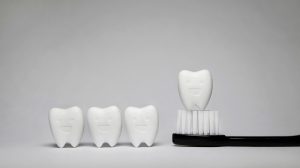If you’ve heard recently that your teeth have multiple layers, whoever the source of this information was is certainly onto something! Your teeth are not solid, opaque blocks that help you chew and speak. Instead, they are multi-layered, multi-faceted little tools that are slightly translucent and that require your care to continue functioning optimally. We encourage you to ask your questions and learn more about tooth layers, so you better understand your smile and its health.

FAQs
Question: When I look at my teeth closely in the mirror, it looks like there are at least two tooth layers of tissue. Is this true? If so, how many layers do I have per tooth and what are those layers called?
Answer: Actually, there are not only two but three layers to your teeth! What you’re seeing is your enamel (the outer, translucent, protective layer of your teeth). Beneath that is your dentin, which is softer and houses some nerves (which is why damage to your enamel can yield sensitivity). Beneath that, which you cannot see, is your dental pulp. It is soft tissue lining the inside of your tooth.
Question: Do the layers allow me to experience some damage without injuring the health of my teeth? Or, do I need to keep every single layer intact and healthy for optimal oral health?
Answer: No, your layers are not there simply as armor. Each is important and essential for your teeth. You must keep them safe (your enamel is the first line of defense but you don’t want it to become damaged).
Question: What are some of the problems that can occur when I allow one or multiple tooth layers to become damaged or eroded?
Answer: When your dental layers become damaged, you may end up with exposed nerves, a greater chance of cracking and breakage, and even infection (because bacteria gain entrance into your tooth).
Learn More About Your Smile During Visits
Come in for a dental checkup every six months, so you feel educated and knowledgeable about your smile and your care. Schedule an appointment with DentaCare Dental in Tyler, TX today by calling (903) 758-5921.